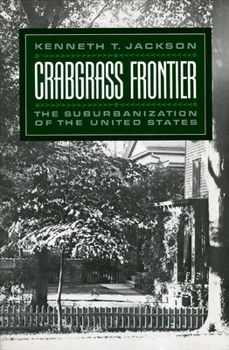Crabgrass Frontier: The Suburbanization of the United States
Select Format
Select Condition 
Book Overview
This first full-scale history of the development of the American suburb examines how "the good life" in America came to be equated with the a home of one's own surrounded by a grassy yard and located far from the urban workplace. Integrating social history with economic and architectural analysis, and taking into account such factors as the availability of cheap land, inexpensive building methods, and rapid transportation, Kenneth Jackson chronicles...
Format:Paperback
Language:English
ISBN:0195049837
ISBN13:9780195049831
Release Date:April 1987
Publisher:Oxford University Press
Length:432 Pages
Weight:0.84 lbs.
Dimensions:1.1" x 5.2" x 8.0"
Customer Reviews
5 ratings
An illuminating book. Feel Smarter for having read the book.
Published by Thriftbooks.com User , 14 years ago
Great book. You have to purchase it or skim it in a bookstore to get a sense of how good it is. Jackson uses historical facts as building blocks to describe the where and why with all of the creation of the US cities, and what that entailed. The Genesis of the City - a bible which describes the creations of the suburbs and sits on the same shelf as Gunther Barth's landmark book -- City People. It explains a lot.
came quickly
Published by Thriftbooks.com User , 17 years ago
Needed book for a college course, and the campus bookstore did not have it. It came within 10 days of order, standard shipping. could not ask for more.
A classical look at the suburbs of the United States
Published by Thriftbooks.com User , 18 years ago
Jackson writes one of the seminal studies in urban history relating to the suburbs. The end conclusion is that suburbs have not been beneficial to the United States. This tracks things from the start of suburbanization to the downfall of downtowns. Race relations are a big part of the book as is the heralding of the automobile. Jackson writes very well and the book is wonderfully organized. If you are starting out in urban history this is an essential book to start off with. For those interested in post world war 2 American life this is also a must read.
great book
Published by Thriftbooks.com User , 18 years ago
Even though the book was written a while ago, it's still really good. I think the chapter on credit and housing was fascinating.
Explanations before condemnations
Published by Thriftbooks.com User , 21 years ago
This book is obviously a classic of urban-studies literature and a lot of people have said a lot of good things about it.One thing to keep in mind when considering this book, however, is that (contrary to what others have said) it is *not* a history of suburbanization through the end of the 20th century. It is much more an explanation of the roots of 20th century suburbanization -- as they took form in the 19th century. The author does an excellent job of explaning the cultural and technological conditions that existed in the 19th century which made the move the the perifery seem attractive and, above all, logical. Today, in the 21st century, we have a difficult time placing oursleves in the shoes of the aspiring 19th century home-owner. We get stuck on the question "How could they just leave their cities to rot?" This book takes us back to show us the ideals, hopes and dreams of the 19th cenury burghers -- which the author also expertly contrasts to 19th-century realities. In this way, Jackson shows us how the move to a tract-house on a winding lane named after a tree could only seem like the conquest of the new-world utopia to the train-hopping clerks who first embraced suburbia. The brightest examples of these cultural trends are the author's description of the rising symbolic importance of the garden, as well as his emphasis on the media-images associated with the new "old" country gentry. Overall, he describes an America (ironically) in search of its "country" roots, while in the midst of the greatest urban/industrial boom the world has ever known. By placing the reader firmly in a world where the word "cab" connoted a horse and carriage and where "pollution" meant horse-dung, Jackson makes us aware that the suburbs arose out of a legitimate desire to improve living standards in a very real way.In sharp contrast, to so many books on the same topic _The Crabgrass Frontier_ is not a vitrolic condemnation of selfishness or race-paranoia or consumer-madness. It is a cultural commentary on certain 19th mores which -- when taken to their logical extreme (as they were in the 20th century) -- have a profound effect on the geography of the modern American city.






